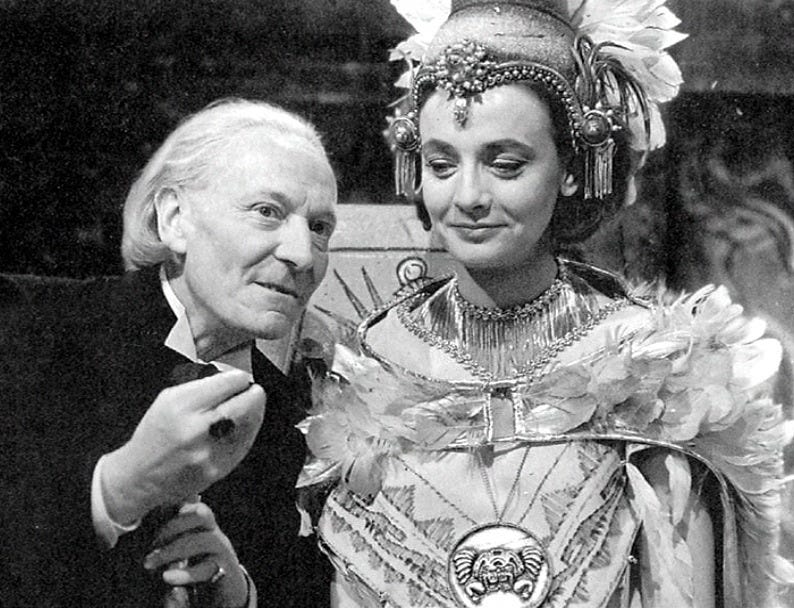1.6: The Aztecs
In which Barbara becomes a god, the Doctor acquires his habit of accidentally getting engaged, and we learn that you can’t rewrite history, not one line.
Broadcast: May-June 1964
Watched: May 2019
1. The Temple of Evil
...and once again Lucarotti arrives and the quality of the script goes through the roof. [The writer, John Lucarotti, who also wrote Marco Polo] It’s a bit school history lesson, but real thought’s gone into it, everyone has something to do etc. The scenery, with the painted backdrop and so forth, is great too. The BBC has always been much more comfortable with period pieces than sci fi, clearly. God I wish we could see Serial D.
Anyway. Ian agrees to train as a warrior a bit quick. The Doctor definitely fancies Cameca, so it’s weird that the asexual Doctor thing ever took hold.
Barbara has not thought her plan through at all: never mind the rules of time, when Cortes shows up this lot are all dead of the common cold, human sacrifice or no. The victim jumping off the roof is a nasty moment. The show suddenly feels very grown up, and also much more like modern Who than it has until now.
Were the Aztecs on the curriculum in 1964 or something? Random choice otherwise. [Eddie Robson helpfully replied that Lucarotti had “lived in Mexico and picked up some of the history”.]
2. The Warriors of Death
There’s something Shakespearean tragedy about this one, isn’t there? All the plotting, the inevitability of it, our heroes tricked into betraying one another. Even the random wrestling bout. Or am I a loony?
The way all the old people stare at Cameca and the Doctor trying to bang is a bit creepy.
The Doctor saying “don’t let him scratch you” distracting Ian so that he gets scratched is quite funny. Why is a middle class science teacher so tough anyway? [Consensus was that, in 1964, a lot of people’s dads had been in the war.]
3. The Bride of Sacrifice
Barbara going straight in with the threat to murder somebody. Awesome.
Everything in this story happens as a direct result of something else. Bit of a shock to the system after Marinus.
“What an excellent idea – a currency you can drink!” That’s a bloody stupid idea Doctor, you’d get incredible price instability. Hartnell does do some great facial expressions in this one, though.
Cliffhanger is top, too.
4. The Day of Darkness
Do they delay the title card? Feels like an unusually ominous build up.
The Doctor’s relief at seeing Ian alive is lovely. The bit of business where they try to open the tomb and all fall over is very silly.
It’s only just dawned on me that Tlotoxl is channelling Olivier in Richard III.
I had an idea that this one had a long series of sacrifices in it, then assumed it was just the novelisation... but no, that’s The Left Handed Hummingbird, isn’t it? [Kate Orman’s New Adventure novel featuring the 7th Doctor, published in 1993.]
Oh god, Ian’s killed again, why will nobody stop this bloodthirsty lunatic.
Anyway. I think this is probably both the most sophisticated script and production yet (though we can’t see Marco Polo, of course). Such a big cast, mostly of well developed and well differentiated characters. Didn’t entirely hold my attention, but I think that’s largely watching it one block.
The cliffhanger is funny. “Why is the TARDIS still moving?” I wonder.



If Ian is about the same age as the actor who plays him – a reasonable assumption, I'd say – then he was born in the mid 1920s. If not called up to serve towards the end of WW2, he would almost certainly have done National Service.
When I was writing summaries of each story for The Complete History, I was surprised to discover that part four of The Aztecs is, IMHO, the most densely-plotted episode in the series' history. It has so much going on, so fast, I suspect it was originally ten or twenty pages longer and David Whitaker had to chop it down. Don't let anybody tell you TV was slow in the 1960s! Doctor Who was probably the most fast-paced show on television.